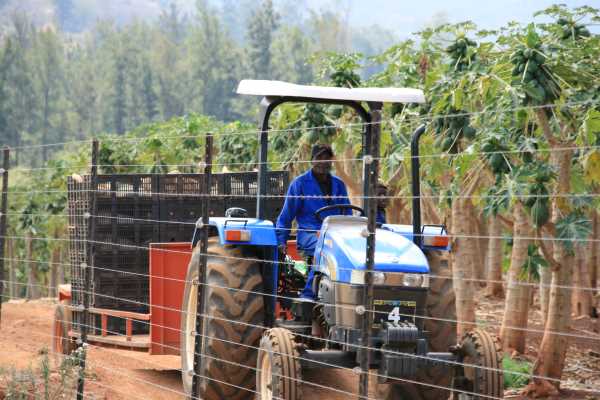Land Reform – The outbreak of COVID-19 and a challenging economic environment which has resulted in budgetary cuts and re-allocation of resources to other priority areas, has impacted negatively on SA’s land reform programme, says the Vumelana Advisory Fund (Vumelana), a non-profit organisation that supports land reform beneficiaries.
According to Peter Setou, Chief Executive of Vumelana – whose objective among others is to enhance land value through establishment of Communal Property Partnerships, lack of funding remains one of the biggest challenges affecting beneficiaries of land reform. Setou says, more work needed to be done by critical stakeholders to support, promote, facilitate access to affordable finance and enable for commercial viability of land reform projects.
“In that way, communities through their own projects can contribute towards job creation, poverty alleviation efforts and the overall social and economic development of the country,” says Setou.
Beneficiary communities whose land has been restituted as part of the land reform programme can now access funding from the Industrial Development Corporation (IDC) to develop their land productively and scale up their farms into successful commercial enterprises.
This development follows the launch of the Agri-Industrial Fund by the state-owned funder and the Department of Agriculture, Land Reform and Rural Development (DALRRD) earlier this year.
“These funds have come at the right time. Many beneficiary communities have been watching without support as reclaimed land has lain fallow due to lack of post-settlement support and lack of access to funding for working capital and purchase of farming equipment,” says Setou adding that financial resources were critical to many claimant communities that have been hamstrung by resources to commercialise their enterprises.
Hence the partnership between the IDC and DALRRD bodes well for the success and acceleration of the land reform programme including for claimant communities that require funding to scale up their operations. However, despite the IDC and DALRRD intervention, Setou remains concerned that eligible projects and communities might still not be able to access funding support.
“In most instances, communities are not aware of facilities available to assist them and do not have the requisite capacity to apply for these funds. There is a need to create awareness of the existence of such facilities, make it easier for communities to access these funds and link them up with credible and experienced implementing partners.”
Citing an example of targeted sub-sectors, which are, high-value export-oriented crops such as citrus, avocado, table grapes, blueberries, and tree nuts (macadamia, etc.), poultry: contract growers minimum 200 000 per cycle, independent vertically integrated operations, layers minimum 50 000, livestock, piggeries, cattle, sheep etc in vertically integrated operations as well as expansionary acquisitions in all of the above sub-sectors, he is concerned that a lot of land reform beneficiary projects might not qualify for funding.
Setou further notes that while the IDC and DALRRD partnership is a step in the right direction, more needs to be done to come up with innovative and suitable financing models to fund land reform projects, especially given the current and emerging government budgetary constraints. “We also need to actively promote partnerships between beneficiaries of land reform and private investors as this is the most expedient way of ensuring productive use of farms.”
Tshepo Ramodibe, Head of Corporate Affairs at the IDC, says the objective of the Agri-Industrial Fund is to support the development and expansion of the agricultural sector by assisting qualifying black producers and investees to develop, expand, acquire and integrate operations in prioritised value chains.
“The Fund is a blended instrument based on a R1 billion grant from DALRRD. The scheme provides grant portion and an IDC loan to black producers or majority black-owned agricultural enterprises. DALRRD has allocated to the IDC over a period of five years, which equates to R200 million a year. The objective behind the Fund is to develop and implement high impact, large-scale commercial agricultural transactions and projects that have a minimum of 60% black ownership, including broad-based community trust structures,” says Ramodibe.
In addition to funding projects and transactions where land has been transferred back to communities and other broad-based groups to set up viable projects on such land, the Fund will also consider new and existing companies within the agro-processing and agriculture sector that plan to create or expand industrial capacity within the economy.
The Fund will also consider applications from livestock and poultry farmers, and agriculturalists that cultivate high-value export-oriented crops such as citrus, avocado, table grapes, blueberries, and tree nuts such as macadamia. Funding for expansionary Broad-based Black Economic Empowerment (B-BBEE) acquisitions in the sector, particularly where most acquisition funds remain within the target company, will also be considered.
The IDC manages the receipt, processing of applications and the disbursement of funds to approved applicants. Both the IDC and the DALRRD select the successful applicants.
Ramodibe explains that the partnership with the DALRRD is in line with the financier’s agro-processing and agriculture strategy that seeks to increase the competitiveness of the key sub-value chains of the agricultural sector that have a strong development impact.
“This Fund is intended to achieve multiple objectives, namely, to stimulate economic growth and expansion of the agricultural sector, accelerate land redistribution and wealth creation by commercialising projects on such land, foster job creation and the transformation of the sector, ramp up exports and contribute meaningfully to a successful effective land reform and rural development programme,” says Ramodibe.
To that end, the IDC will consider applications from poultry farmers that seek to increase production capacity to a minimum of 200 000 birds per cycle, or piggeries that intend to increase to a sow unit of between 300 and 350 sows.
Ramodibe agrees and adds that post-settlement support is necessary to achieve a successful land reform programme.
“While there have been programmes by government to support land restitution beneficiaries and black commercial farmers, these initiatives have often been too fragmented and were not given enough impetus to gain momentum. This hybrid financing model addresses the challenge of access to funding by emerging black commercial farmers. Equally important, specialist support to help farmers with access to markets, especially for high-value products, will ensure that ventures receive maximum support and can flourish,” Ramodibe concludes.









I want to do bussiness by i don’t have money and materials. I have land ck:2018/328327/07
Comments are closed.